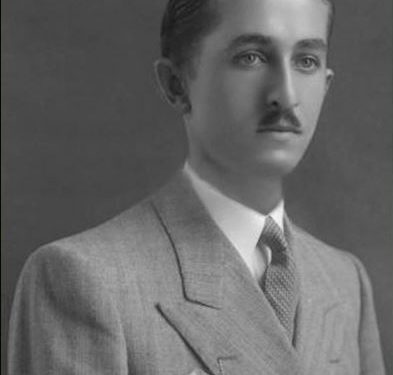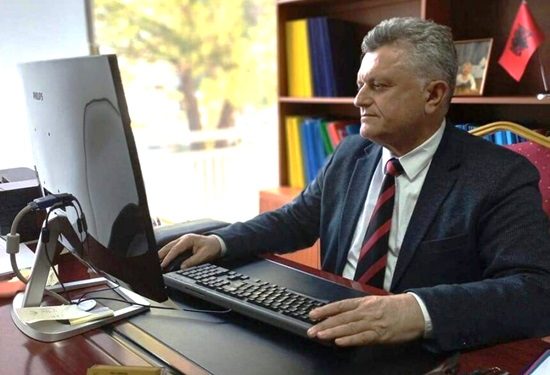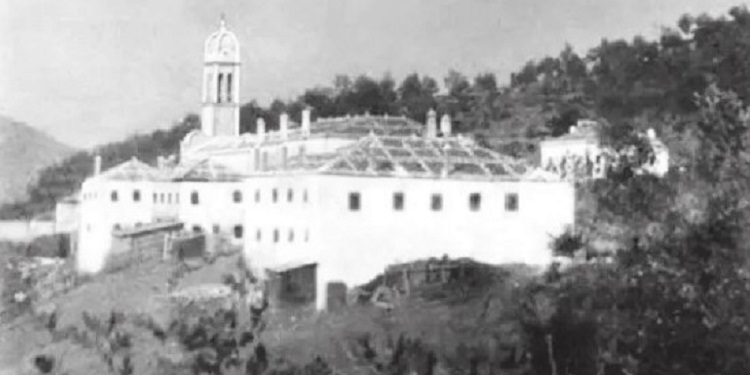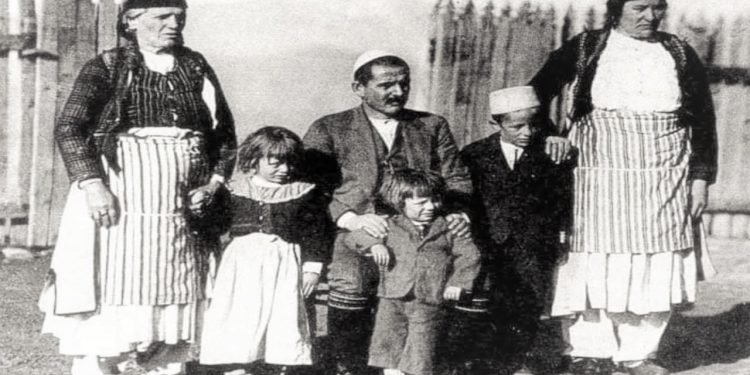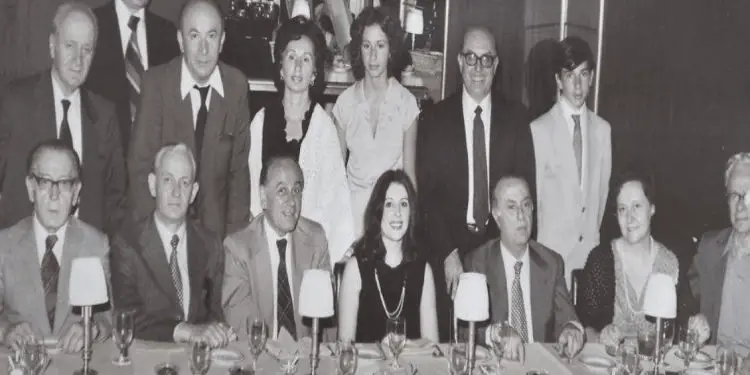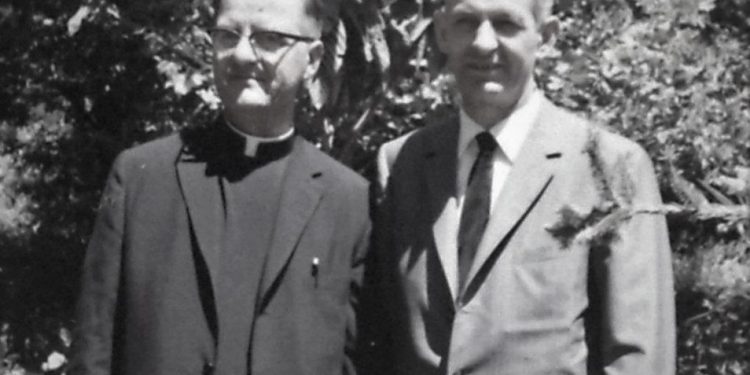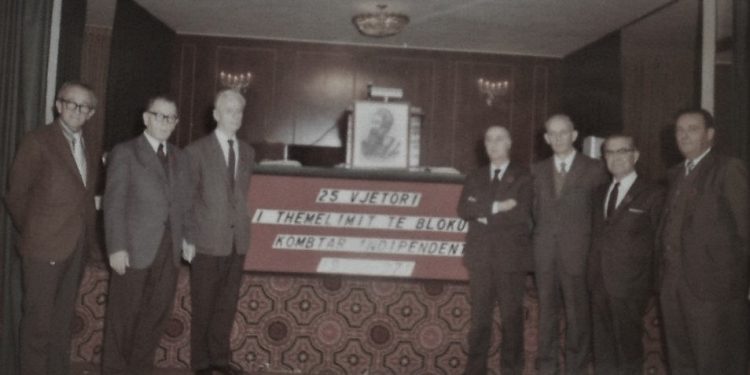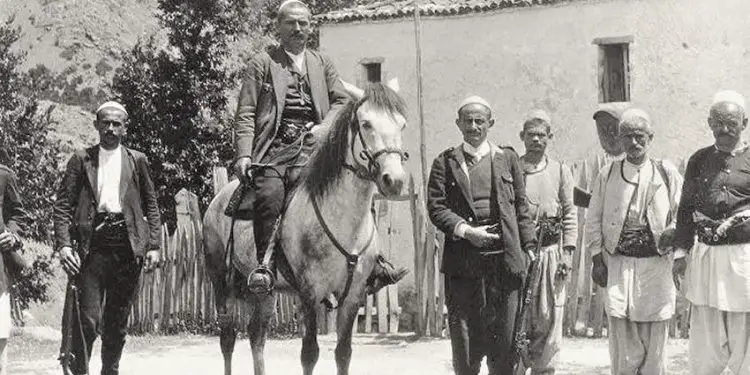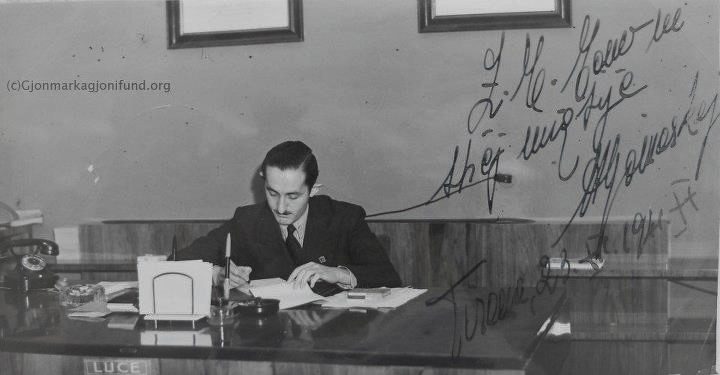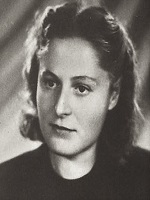By Ndre Molla
– The Anti-Communist Resistance of Captain Mark Gjon Marku in Mirditë –
Memorie.al / Geographically, Mirdita are at the heart of Albanian territories, where 800 years ago, the State of Arber was established. They have always attempted to dismantle this Illyrian-Arber miracle, yet it has managed to remain a national history, never conquered, never subdued, like a natural and human fortress. The resistance of Mirdita has been paid for with blood and superhuman sacrifices throughout its history. It has survived for centuries, thanks to a unique social self-organization, typically Albanian, self-governance through the Kanun (rules and customs, accepted and practiced from generation to generation, with a remarkable and irreplaceable will), at the pinnacle of which stood the Princely House of Gjomarkaj and the faith in Christ.
Heroic Mirdita never truly saw itself conquered and brutally oppressed until the arrival of the Slavic-Russian communist regime in the Albanian territories, the fiercest regime this region has known, which for 45 years denied the freedom of everything that freedom produces. Mirdita, which withstood 500 years of Ottoman occupation, fell into the hands of the Albanian communists of Enver Hoxha and his successor, Ramiz Alia, who killed, mutilated, impoverished, and deformed it, destroying the highest values it had in its history, such as dignity, honor, faith, and freedom.
But the greatest damage, for today and the future, the communists inflicted on the truth of the history of Mirdita, by burning and destroying the archive of the ABACIA of Orosh and manipulating the truth, just as communists know how to manipulate. For 80 years, the most honored men of this nation, the greatest nationalists and patriots, the clergy, who kept not only the faith alive among Albanians but also knowledge and culture, along with the pride of being Albanian, have been labeled as anti-national and collaborators. When, in truth, the only reason for their cooperation in every circumstance has been the national interest.
To speak of the anti-communist resistance in Mirdita, one must first pass through its First House. At the head of the anti-communist resistance was Mark Gjon Marku, the leader of the “National Committee of the Mountains,” one of the rarest human values that this house has produced, in my opinion. Thus, Mark of Gjoni belongs to the blue blood of the Arbërore territories, their roots trace back to Pal Dukagjini and come up to the present day, as the First House of the Kanun.
In this case, let me bring to your attention a very significant fact: in all the customary rights around the Balkans, in Serbian, Bulgarian, Montenegrin, etc., even though they had kings and monarchies, none of their customary rights established the canonical norm that the First House of the Kanun is the House of a specific Leader of theirs.
This has only happened with us. This shows that we are not only the heart of the state formation of the Albanians with princely roots but also how important it was to have a Leader at the head of the self-governing organization in Mirdita and all of Dukagjin. He stood against every evil that threatened this land, gaining unquestionable credibility among all the Albanian territories where Albanian is spoken.
Many of you know, as I do, the national values of this glorious Albanian House. But I will briefly try to draw attention to a very significant and delicate moment for the Albanian Nation and especially for Mirdita, the Anti-Communist Resistance of Mirdita and beyond, under the leadership of the Captain of Mirdita, Dr. Mark Gjon Gjomarkaj.
From contemporaries, family members, historians, and passionate researchers of the history of Mirdita, light has often been shed on the period of 1940-1953 regarding the leadership activity of the First House, especially the entire family of Captain Gjon Marka Gjoni, headed by Captain Marku of Gjoni. As always in its history, the First House of Mirdita had the primary duty to confront the communist plague.
At the forefront of the anti-communist resistance was Dr. Mark Gjomarku, who, as a well-rounded intellectual, patriot, and nationalist, understood that a true plague was threatening the Albanians, aimed at destroying the most existential national values and sowing the seeds of evil through Slavic-Russian communism, the consequences of which are well known.
Captain Dr. Mark Gjon Marku declared more resolutely than ever to his supporters: “I have not yet fulfilled my duty to the homeland… I will not abandon Albania, and I will not forsake the people who have followed me with loyalty. I will stay with them, and with them, I will die in the mountains of my homeland.” – This taken from Prof. Nue Oroshi’s study. In another communication with Ndue (his brother), Dr. Mark Gjon Marku responds:
“Ndue, today begins a new political turn, not only for our country, Mirdita, but for all of our Albania. The oppressive communist force threatens us. It degrades, violates, and stains everything sacred that an Albanian holds dear: the feelings of an ordinary person, his name, his identity, his pure moral virtues, family, honor, loyalty. The great God is not recognized as a deity, and we have no choice but to resist with the power that we have at our disposal…”
What a brilliant prediction! Tell me, dear participants, which of these that Captain Dr. Mark Gjomarkaj warned about 78 years ago were not proven, did not happen among the Albanians? Did they humiliate us?! Did they violate us?! Did they stain everything sacred to the Albanian people?! Did they destroy the most beautiful feelings of the Albanians?! Did they tarnish our names, attributes, and moral values?! Did they corrupt our families?! Did they take away our honor, loyalty, and bravery?! Did they even destroy our faith in God?
The communists, dictated by the Yugoslav communists, would fight and eliminate every basis of the Albanian national movement, especially for the unification of Albanian territories. When they destroyed and burned the properties of the Gjomarkaj family, they were after Mirdita and Gjomarku. When they destroyed the ABACIA of OROSH, they were confronting God and Mirdita.
I have emphasized in another topic organized by the Patriotic Association of Albanian Intellectuals “Trojet e Arbrit” in Kosovo: At the Congress of Përmet on May 24, 1944, the Albanian Communist Party and the Yugoslav Communist Party decided to start a civil war in Albania. The assault of the First Division of the National Liberation Army of the Communist Party, supported by the Second and Third Yugoslav Corps, aimed primarily to establish communist power through the barrel of a gun even in Northern Albania.
This was also the time when the communist massacres began in Mirdita, but also when the nationalists and patriots of Mirdita and all of Albania resisted with arms in hand. Practically, for the first time, Mirdita saw itself occupied. What would her sons do? Accept Slavic-Russian communism, or fight against it with every means? To better understand what Captain Dr. Mark Gjomarkaj fought for and how right his struggle was, I would like to draw your attention to what the Yugoslav leadership dictated at the Congress of Përmet through its delegates:
“The reactionaries (meaning nationalists, Albanian patriots, and the most prominent families, the First House of Gjomarkaj, Captain Dr. Mark Gjonmarkaj, Muharrem Bajraktari, Mehdi Frashëri, Kol Bib Miraka, etc.) were successful in uniting the people of Northern Albania in the fight against us and were able to convince that people that we are for the Serbian and communist cause.” This statement reveals how far-sighted the Albanian nationalists were concerning the goals of the Yugoslavs. They aimed to thwart the unification of Albanian territories and certainly did not seek ideological communist internationalist brotherhood… as they camouflaged themselves.
The complete vassalage of the PKSH and Enver Hoxha towards the Yugoslavs is also understood from the message to the Congress of Përmet that: “Only it (the PKSH, my note) would be the guarantor of the proper development of events in Albania.” So, look at how the Yugoslav objectives are linked to the warning that Captain Dr. Mark Gjomarkaj made at that time about the Slavic-communist danger threatening the Albanian nation. That the developments were favorable for the Serbo-Slavs is evident and was seen in the abandonment of Kosovo under Yugoslavia, even with the approval of the Albanian communist government.
Indeed, even today the black clouds disguised as the “Open Balkans” are being seen. This indomitable figure, a loyal patriot, organized the anti-communist forces with the best young men from Mirdita, Puka, Kukës, Dukagjin, and the Great Highlands, Mati and Dibra, Kurbini and Kruja, and took to the mountains for freedom. They certainly had great hope for Anglo-American support, but it proved ineffective and, as later revealed by the geopolitical situation, even dubious.
By then, Dr. Mark Gjomarkaj was not only the Captain of Mirdita but also a man who had the trust of all Mirdita, a leader, brave, astute, knowledgeable, a patriot determined until death, and loyal to the national ideal, who would do everything to prevent Albania from falling into the hands of Slavic-Russian communism. Meanwhile, the communist occupiers had burned the historic self-governing fortress, a symbol of Mirdita’s resistance over the centuries, the residence of the Gjomarkaj family. In fact, the Albanian communists did what the Ottomans and the Serbs had done before, as it was not the first time the center of Mirdita, the residence of the Gjomarkaj family, was burned.
In March 1945, Dr. Mark Gjomarku formed the Central Committee of Mirdita… which would later be called the “National Committee of the Mountains.” As a true leader with national responsibility, in September 1945, Mark Gjomarku made a call to all the northern provinces of Albania for armed resistance against communism. On September 15, 1945, in the Zepa Mountains of Fan of Mirdita, a meeting of this Committee was held under the leadership of Dr. Mark Gjomarkaj. The meeting was attended by:
Leaders like Muharrem Bajraktari, with 150 fighters, Preng Gjergj Keqi and Ali Gjoci, with 30 men, Bilal Kola and Kurt Sul Kurti, with 40 men; Mark Gjomarku with 100 men, etc. Due to the difficulties and obstacles posed by the actions of the Pursuit Forces of the Slavic-communist government of criminals Enver Hoxha and Mehmet Shehu, and the impossibility of connections, Dibra, Kruja, Puka, Dukagjin, Kelmendi, and Elbasan were absent…! It was also decided that resistance against communism should be expanded by establishing connections with the anti-communist groups in Kosovo, which had bases in Gjakovë and Prizren and were in contact with nationalists like Muharrem Bajraktari and Pashuk Bib Mirakaj.
“In his memories, Mr. Nikoll Melyshi, a comrade-in-arms of the Captain and leader of the anti-communist forces, emphasizes that: ‘On October 27 and 28, 1945, a meeting was held in Mirdita, in the mountains of Qam, where anti-communist representatives from all provinces that were invited participated, with the exception of those from Dibra, Mati, and Elbasan, as they had fallen in struggles with the communists!
At that meeting, the forces of the delegates from Mirdita, Luma, and the Dry Has joined together; such as Muharrem Bajraktari and Mehmet Bajraktari who were united with the delegates from Kosovo, Adem Ali Pozhari, Mehmet Ago Roshkoci, and Pashuk Bib Mirakaj; Ymer Bardhoshi and Mark Malaj; Gjon Dostanishta; with people from Puka, Dukagjin, and the Greater Highlands. The freedom fighters spent 48 hours together, wisely and confidently discussing the critical issues surrounding our people. The conversations were aimed at finding a way to remove the chains of the red tyranny from the tightly squeezed throat of the Albanian people!
The entire population of Northern Albania had become conscious enough to go to war; they were just waiting for an order from the Chairman of the exiles…! Many decisions were made, but not one for the outbreak of a rapid revolution, due to the absence of delegations from Dibra, Mati, and Elbasan, but above all due to the absence of Chairman Mark Gjomarku, as he was very ill. This was the reason why another meeting was set for April 15, 1946, in the mountains of Zepa in Mirdita.
Unfortunately, that meeting also failed because Mark Gjomarku, on April 13, 1946, while traveling to attend the meeting with 65 fighters, fell into conflict with the communists in the village of Domgjon in Fan…! Mark Gjomarku could not engage in the war for three days straight, thus he could not go to the designated meeting…! Despite the connection and conviction for a common fight being realized in all Northern provinces and in central Albania, unfortunately, the strong and numerous crowds of the communist special brigades pursuing the wars had paralyzed all the provincial meetings…!”
“In the agreement made by Mark Gjomarku with the leaders of Shkodra, Durrës, and Tirana, in coordination with other provinces of Northern Albania, it was decided that the Central Committee would be transferred from Mirdita to Shkodra, under the name ‘Bashkimi Organization’ (with pseudonyms and unspecified offices)… After the designation of the Central Committee in Shkodra, the Mirdita Provincial Sub-committee was named ‘National League of the Mountains’…! At that time, 530 committed fighters circulated in Mirdita, organized into groups from 5 to 10 members each…”
Nikoll Melyshi concludes his narrative by stating.
The communist government of Tirana formed the Special Pursuit Brigades, composed of partisans (imagine partisans when the war was over, meaning partisans against Albanians), all with monthly salaries, and sent three brigades, each with 1,500 men, to Mirdita to pursue the Mirditas fighters. The people supported and sheltered the fighters and were not at all intimidated by the tortures and daily executions carried out by the partisans in every village.
Captain Dr. Mark Gjomarku knew that only a general mobilization of fighters from their homes would lead to a victorious struggle, and that was his aim. Certainly, events had a rapid dynamics and the geopolitical situation also made a general organization impossible, as Chairman Captain Dr. Mark Gjomarku had aimed. Thus, in his plans, there was a well-defined military organization. On the other hand, the communists, under the guidance of their Yugoslav mentors, had intensified measures to occupy every inch of Albanian territory. They were informed about the organization of the ‘National Committee of the Mountains.’
Here is how the communists expressed themselves in their circular of the time:
‘In the conditions where the remnants of the traitorous bands had suffered heavy blows and significant human and material losses, while the forces of the III Corps, under the Party’s leadership, were conducting fierce operations for the ‘complete extermination of the reaction,’ targeting the main war criminals that had not yet been exterminated, such as: Mark Gjomarkaj, Muharrem Bajraktari, Prengë Përvizi, Prenk Cali, and Llesh Marashi, Pashuk Miraka, Fiqiri Dine, Hysni Dema, in order to escape from their dire situation and to organize themselves, gathered in February of 1945, in the mountains of Mirdita, forming the ‘Committee of the Mountains.'”
“At the head of this committee, which aimed to unite all the nationalist Albanians of the north, fighting against the power of the people’s democracy (here the communists tell the truth because the fight of the ‘National Committee of the Mountains’ was clearly a struggle against the Slavo-communist power that was being installed by force in Albania. My note) was Mark Gjomarku and 9 deputy/chairpersons who were: the Bajraktari of Luma, Muharrem Bajraktari, the former Zogist captain and an exponent of the Legality in Mati, Bilal Kola, the representative of Dibra, the bajraktari Dan Kaloshi, Pashuk Biba of Puka, Prengë Përvizi of Kurbin, etc.!
The organization founded by Dr. Mark Gjomarku, together with the other bajraktars of the north and northeast, was politically and militarily oriented. They had declared communism as a scourge threatening Albanian lands. The draft statute that Captain Dr. Mark Gjomarku wrote demonstrated his intellectual ability, high national responsibility, patriotism, and legal culture. In that draft statute, Captain Dr. Mark Gjomarku aimed and called for establishing peace among fighters, stopping any kind of disputes or feelings of revenge, regardless of the reasons, until the war against communism was concluded.
He sought the same thing for the fighters to stop any form of revenge against the people for any altercations. Meanwhile, only the communist spies among the people would be eliminated with the signature of the Chairman of the Organization. This was a very serious matter because, at the beginning of 1945, in Shpal of Mirdita, the communists organized the Information Office, which connected the network of spies throughout Mirdita, an office directed by Bardhok Biba.
This draft statute and program also provided assurance to the ‘National Committee of the Mountains’ organization among the people, but also encouraged the people to support the freedom fighters. It should be emphasized that, despite the terror exerted on the population by the communists and the Pursuit Forces of the criminal Mehmet Shehu, the people loved in their hearts the Freedom Fighters and their leader, Captain Dr. Mark Gjomarku. They welcomed and sent them off, fed and sheltered them, paying with their lives.”
“With these decisions, the Captain aimed to make a difference both on the ground and in the fight against the communists. Thus, he wanted the people to understand that these fighters were not there to take reprisals against the people, nor to kill and massacre individuals without trial, as the communists had begun to do from village to village throughout Mirdita. This anti-communist political-military organization had as its main objective the prevention of irreligious communism, which aimed to destroy the highest values and virtues of the Albanian nation. They fought so that Albania would not fall into the hands of the Yugoslavs, their century-old enemies. They viewed communism as a form of denationalization. This is enough to understand what ideals guided the brave ones for true freedom.
Regarding the further activities of the ‘National League of the Mountains,’ former leader Nikoll Melyshi testifies: ‘On May 6, 1946, a great historic meeting took place, with representatives from other regions. That meeting almost resembled a Congress of the ‘National League of the Mountains.’ The meeting was held in the dense forest of Rrasa e Bardhë, Rrëshen-Kthellë, where delegates from various provinces of Northern Albania had gathered. In addition to the 450 mountain fighters, 500 men from Kthelle and Mirdita also participated, each bringing bags of bread and cheese for the delegates from other provinces.
… The assembly was presided over by Dr. Mark Gjomarku, who openly presented to the people the points of the draft statute… of the ‘National Alliance of the Mountains.’ He informed the attendees at this meeting about the formation of a General Staff and the preparation of a military organization, to lead the people into the anti-communist struggle.
The General Staff was further supplemented by officers of the former army and was composed of mountain fighters. This staff included two councils:
a) The esteemed Executive Council with three leaders:
- The Chairman Dr. Mark Gjomarku, with the pseudonym ‘Vala e Drinit.’
- Military member, former first-class captain, Nikoll Mëlyshi, with the pseudonym ‘Vala e Fanit.’
- Political member, the brave former captain, Ndrec Shkurt Lufi, with the pseudonym ‘Vala e Matit.'”
“b) The Extended Consultative Council was composed of all officers who were members of the General Staff, each with specific duties…!
The document was signed by the participating representatives of the provinces.
At the conclusion of the meeting, the second general meeting was scheduled for May 20, 1946, in Perlat of Kthellë. Meanwhile, the province of Mirdita set a preliminary meeting for May 12, before this date, as the organizing base of the uprising that it was. Several decisions were made at this meeting:
- “The form of greeting among the fighters and the people would be: ‘Down with Communism,’ ‘Long live Albania.’
- An organic military objective was established for the start of the revolution, consisting of 12,000 volunteers from 12 bajraks of Mirdita, completing the cadre by forming teams and battalions according to the bajraks, with the officers and non-commissioned officers of their soldiers. Among the 500 mountain fighters were skilled officers and cadres in their careers who served many organizational issues for the General Staff, aiming to put the entire population into military structures.
- In addition to the three members of the staff, the following urgent officers were appointed near the Staff: Captain Nikoll Preng Gjomarkaj, Captain Nikoll Përdeda, Captain Islam Daci, Captain Mark Dod Gjini, Captain Gjon Mëhilli, and Lieutenant Kol Bajraktari, etc. Near the political section: former deputy prefect Pjetër Llesh Gjoni and former commune chairman Mark Bajraktari.
- Every decision after that meeting would be presided over and signed by the Chairman of the Organization and two members of the Staff, using pseudonyms.
The meeting concluded by urging the fighters not to miss the meeting on May 20, 1946, and special persons were assigned to call the representatives of Luma, Dibra, and Kosovo…,” recalls Captain Nikoll Melyshi. “Almost all the exiles from Mirdita participated in the general meeting on May 20, but unfortunately, those from all other provinces were missing due to the communist forces that had begun extensive pursuits, especially in the area of Mirdita.”
“At the time when the General Staff, with its 9 main members, among them several other fighters, were in Ujë-Lurth on June 13, 1946, they planned to travel at night through Prosek to reach the Tjegullës forest (Bojdine). This journey on foot at night took 4 hours. Among these fighters was the leader Mark Gjomarku. The Pursuit Forces, informed by their agents, had apparently tracked down their location and movement plans.
As a result, in addition to the numerous Pursuit Forces that were already operating intensively in Mirdita, two partisan combat brigades were mobilized from Shkodra and Tirana, surrounding the members of the Staff, including Dr. Mark Gjomarku. On the night of June 13, 1946, Captain Dr. Mark Gjomarku was severely wounded around 3 o’clock in the morning. When day broke on June 14, the partisan Pursuit Forces, following the trail of the significant blood loss from his serious wound, reached the wounded individual. The leader of the rebels, Mark Gjomarku, gravely injured and surrounded by numerous communist forces, knowing he could not escape, shot himself to avoid falling alive into the hands of the communists.
However, the fight for freedom, the anti-communist resistance, did not cease. Leading the Movement was his brother, Captain Llesh Gjon Marku, who, in combat with the Slavo-communist Pursuit Forces, was killed, and the leadership was again taken over by another fighter from the Captain’s House, Captain Ndue Pjetër Gjomarku. It should be emphasized that the unsuccessful outcome of the armed anti-communist resistance was also aided by the geopolitical maneuvers of the Western allies, who, despite the promises made for support, left them alone against the communist forces and made the victory of this struggle impossible.
Esteemed participants! The life, work, and glorious history of leader Captain Mark Gjomarku cannot be conveyed in such a short time. The materials I have collected are much more extensive; I have abbreviated them due to the time available. However, I can summarize these basic conclusions in this Here’s the English translation of the text you provided:
- “First; the Gjomarku family has never abandoned Mirdita, always leading it in its most difficult days. Therefore, it has found support in Mirdita and throughout Albania.
- The anti-communist struggle led by Captain Dr. Mark Gjomarku was a patriotic and national fight to save Albania from Slavo-communism.
- Every decision, every participation, every commitment, and every collaboration at any time and with anyone was made by Captain Dr. Mark Gjomarku, alongside other patriots like Mustafa Merlika, Pader Anton Harapi, Kol Bib Mirakaj, Muharrem Bajraktari, and all nationalists for the good of the country, out of love for the nation for which they sacrificed. Eternal glory be upon them!
As a conclusion to this short speech regarding Captain Dr. Mark Gjomarkaj’s struggle against the Slavo-communist regime, it has been a deeply national activity, with national interest. Time has vindicated Dr. Mark Gjomarku, the Gjomarku family, and the best sons of Mirdita and all other nationalist provinces, who united and acted with arms in hand, sacrificing themselves against the communist plague.
It took 45 years to understand how important it was that Albania did not fall into the hands of the Slavo-communists. The nation would have united and would have been with the West as a developed country. Even to this day, we suffer from the fall of Albania into the hands of Slavo-communism. Therefore, remembering, promoting, and educating society about leaders like Captain Dr. Mark Gjomarku and the freedom fighters is a patriotic duty of our generation so that history does not repeat itself, and we must never give up on the truth.”
“For the anti-communist nationalist patriots, before monuments, before decorations—which are also very important—they need the truth. We must do this because even today our children are being educated by a curriculum that is similar to that of the communist era, where true nationalists and patriots are labeled as collaborators, while Slavo-communists are praised. Shameful but true. So what should be done? The truth must be spoken; we need to not only state it but also convey the truth to the people.
Captain Dr. Mark Gjomarku was a great patriot who, together with other great national figures such as Mustafa Kruja, Ernest Kolqi, Mehdi Frashëri, Maliq Bushati, Terenc Toci, Kol Bib Miraka, and other national personalities of the time, worked and fought with knowledge and blood for Ethnic Albania and sacrificed themselves for it. Eternal honor to these Men of the Albanian Nation, who gave their lives for Ethnic Albania against Slavo-Russian communism!/Memorie.al
Excerpt from the address at the Memorial Academy, on the occasion of the 76th anniversary of the assassination of Captain Dr. Mark Gjomarku by the Pursuit Forces.”




